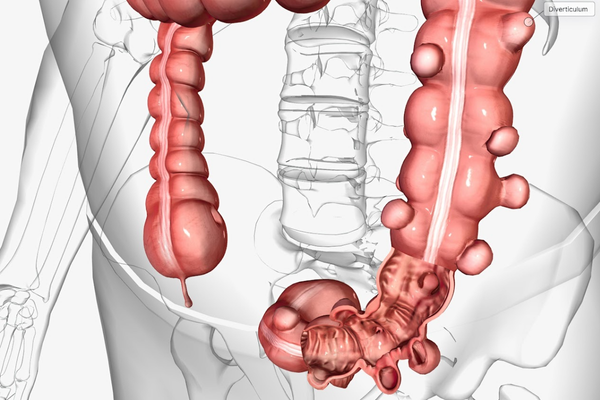Diverticular Disease: Prevention and Treatment In Hyderabad
A Gastroenterologist's Guide to Symptoms, Causes, and Treatment in Hyderabad
For many, a sudden, sharp abdominal pain, often accompanied by fever and a change in bowel habits, can be a source of great concern. While symptoms might feel like a severe case of indigestion, they could be a sign of a more serious condition known as diverticulitis. This condition, which involves inflammation or infection of small pouches in the colon, is increasingly being seen in urban centers like Hyderabad. As a specialized gastroenterologist in Hyderabad, we are dedicated to helping our patients understand this condition and providing the most advanced care. This guide will walk you through everything you need to know about diverticulitis, from its causes to modern treatment options, so you can make informed decisions about your health.
What Is Diverticulosis vs. Diverticulitis?
It's important to understand the difference between two related conditions: diverticulosis and diverticulitis.

Diverticulosis
This is the presence of small, bulging pouches (diverticula) that form in the lining of the large intestine (colon). It is a very common condition, especially as people age, and often causes no symptoms.
Diverticulitis
This occurs when one or more of these pouches become inflamed or infected. This is a much more serious condition that requires medical attention. Most people with diverticulosis will never develop diverticulitis, but a low-fiber diet and a sedentary lifestyle are known risk factors.
Symptoms of Diverticulitis: Don't Ignore the Warning Signs
The signs of diverticulitis can range from mild discomfort to a severe medical emergency. The most common symptom is abdominal pain, which is typically:
Constant and intense
It usually localizes to the lower-left side of the abdomen, but can occur on the right side as well.
Accompanied by a fever
Associated with nausea and vomiting
Often includes a change in bowel habits
Such as constipation or, less commonly, diarrhea.
Additional signs
In some cases, people may also experience rectal bleeding or a feeling of tenderness when the abdomen is touched. If you experience these symptoms, especially if they are severe, it is crucial to consult a stomach specialist in Hyderabad immediately.
The Causes and Risk Factors
While the exact cause of diverticulitis is not fully understood, it is believed to be linked to a combination of genetic and lifestyle factors.
Low-Fiber Diet
A diet lacking in fiber can lead to constipation and increased pressure in the colon, which can contribute to the formation of diverticula.
Lack of Exercise
A sedentary lifestyle is associated with a higher risk of developing diverticular disease.
Obesity
Being overweight significantly increases your risk.
Aging
The condition is more common in individuals over the age of 40.
Smoking
Smoking is also a known risk factor.
Urban Lifestyle
The modern urban lifestyle in Hyderabad, with its reliance on processed foods and a more sedentary routine, may be contributing to the rise of this condition.
Diagnosis: A Precise Approach to Treatment
A proper diagnosis is the first step toward effective management. As an experienced gastroenterology clinic in Hyderabad, we use a combination of methods to get a clear picture of your condition.
Physical Exam and Medical History
We will conduct a thorough examination and discuss your symptoms, lifestyle, and medical history.
Blood Tests
These are used to check for signs of infection or inflammation.
CT Scan
A Computed Tomography (CT) scan is the most effective diagnostic tool for diverticulitis. It helps us confirm the presence of inflamed pouches and check for complications.
Colonoscopy
After the acute inflammation has subsided, a colonoscopy is often recommended to examine the entire colon and rule out other conditions.
Treatment for Diverticulitis: A Personalized Plan
The diverticulitis treatment approach depends on the severity of your condition.
For Mild Cases
For Severe Cases
Prevention After Recovery
Once the infection is cleared, the focus shifts to preventing future episodes. This involves adopting a high-fiber diet, drinking plenty of water, and regular exercise.
When to See a Gastroenterologist: Your Health Is a Priority
Diverticulitis can be a serious condition. If you experience any of the symptoms mentioned above, do not delay in seeking professional medical help. You should consult a gastroenterologist in Hyderabad immediately if you have:
Frequently Asked Questions (FAQs)
Can diet prevent diverticulitis?
Can diet prevent diverticulitis?
Yes, a high-fiber diet rich in fruits, vegetables, and whole grains is the best way to prevent diverticulosis from progressing to diverticulitis.
Do I have to avoid seeds and nuts?
Do I have to avoid seeds and nuts?
The long-held belief that seeds and nuts contribute to diverticulitis has been largely debunked by modern research.
Is diverticulitis a form of cancer?
Is diverticulitis a form of cancer?
No, diverticulitis is not cancer, nor does it increase your risk of developing colon cancer.
Will I need surgery for diverticulitis?
Will I need surgery for diverticulitis?
Most cases of diverticulitis can be managed with medication and dietary changes. Surgery is reserved for severe or recurrent cases.
Conclusion
Living with a digestive condition can be challenging, but with the right guidance and care, you can manage it effectively. As your trusted gastroenterology clinic in Hyderabad, we are here to offer expert diagnosis and a personalized treatment plan for diverticulitis. Don't let abdominal pain control your life—take the first step toward better health today.
Disclaimer Disclaimer: The information provided in this page is for educational purposes only and is not a substitute for professional medical advice, diagnosis, or treatment. Always seek the advice of a qualified healthcare provider with any questions you may have regarding a medical condition.
